Foods to Avoid When you Have ADHD
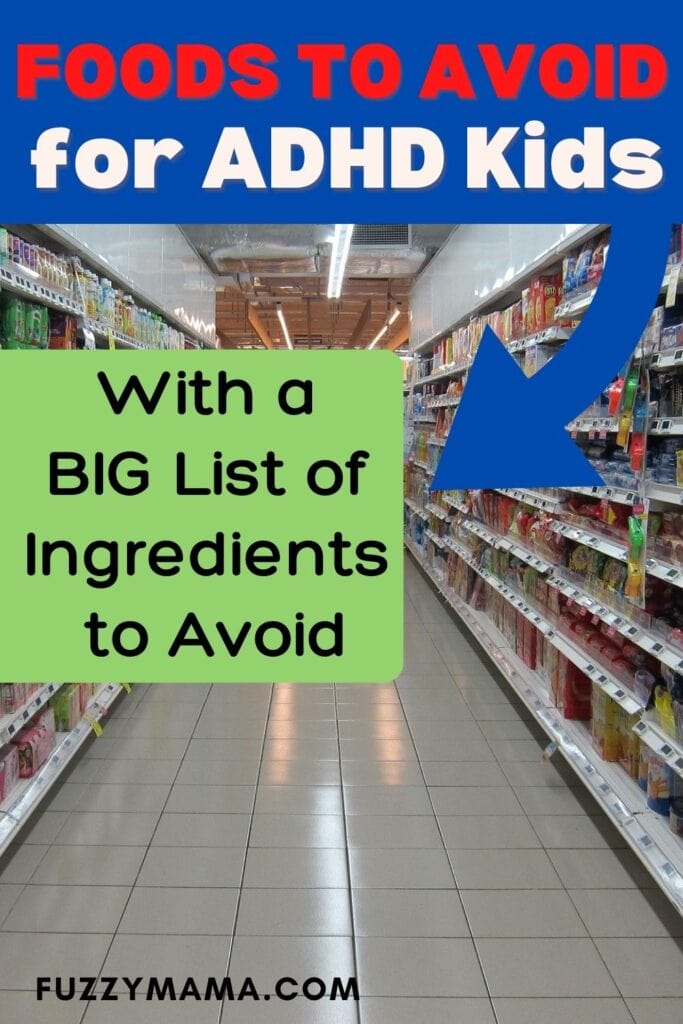
You may be asking yourself, “What foods should I cut out for ADHD?” This will help get you started in the right direction and know what to avoid in your ADHD’ers diet.
I have known for a long time that sugar is one of the foods to limit for a hyperactive child, but what I have found out over the past few years has put sweet foods on my list of ADHD foods to avoid for many reasons.
And Spoiler Alert !! There is more to avoid than sugar!
It’s also about the toxic sweeteners masquerading as sugar and the dyes and preservative that go along with highly processed foods, that has made me certain about what foods to avoid for ADHD.
Caveat: I am not a doctor, nor a nutritionist. I share this for informational purposes, so you can do a deeper dive into what you are eating and feeding your kids.
AND, this is not about perfection. This is about arming yourself with information and making better choices over time. It is nearly impossible to avoid these foods 100% of the time. Aim for the 80/20 rule and try to keep these trigger foods making up only 20% of your overall diet.
***Some of the links in this post are affiliate links. See our policy here.***
Why do ADHD kids love sugar?
ADHD kids love sweet and carb loaded foods because they raise dopamine levels, a chemical that ADHD kids usually are deficient in.
So what, isn’t that a good thing?
NO.
Along with that temporary rise in dopamine comes a host of negatives side effects when you mix sugar and the ADHD diet.
The Quick Back Story about my ADHD Kiddos
I had a reason to research how food affects ADHD – my oldest son. He was crazy about sugary foods and granola bars and bread, really any processed carb he could get his hands on.
He seems to crave it. All. The. Time.
It could make him extremely emotional, angry, and combative.
In fact, when I started to suspect my oldest had ADHD , food was one of the first things we changed. I saw a change in behavior almost immediately. We now do our best to follow an ADHD Diet , get as much protein as we can and try to be super duper, low on sugar.
While I was learning about sugar and all the reasons to avoid sugar – many other foods cropped up as foods ADHD kids should avoid.
Related: If you are feeding kids with ADHD, these cookbooks will make your life so much easier!!
So, what foods should you avoid for ADHD?
Scroll Down for a Big List of Foods to Avoid That You Can Screenshot and Take to the Store.
1. Limit Sugar
“Sugar” and ADHD might be worse than you think. These facts, when seen together, really paint a horrible picture for sugar.
- Many studies have shown that sugar increases inattention.
- 1 in 4 teens are now considered pre diabetic as a result of too much sugar consumption.
- Sugar is more addictive than cocaine and causes an addictive response in the brain.
Wait, there’s more bad news about sugar and ADHD:
- Sugar interferes with the actions of calcium and magnesium, increases inflammation, increases erratic brain cell firing, and has been implicated in aggression.
- Studies showed sugar causes increased slow brain waves, and a study at UCLA showed that sugar alters learning and memory.
- Sugar does not fill you up and encourages you to eat more.
Sugar does damage to the liver , building up fatty tissue, leading to liver disease. Also, when you are eating sugary foods, you are less likely to be getting the nutrients your brain needs to function, increasing your ADHD symptoms.
Sugar can also wreck havoc on our dopamine levels, as our brains become used to high levels of sugar. ADHD kids (and adults) have lower levels of dopamine, and so sugar can be especially addictive for them. In fact, dopamine receptors can be altered in certain areas of the brain from consuming too much sugar over a long period of time.
The effect sugar has on dopamine and dopamine receptors makes it addictive and is why it is often so difficult to eliminate sugar from the diet.
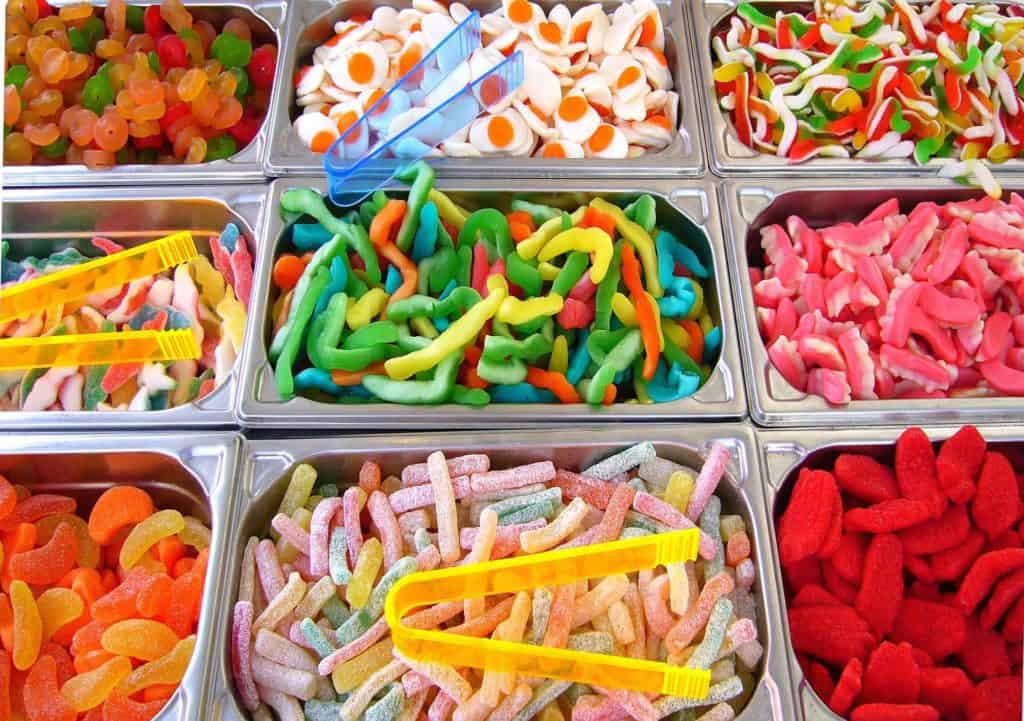
What is the worst form of sugar?
Most of the sweetener we consume, as Americans, is High Fructose Corn Syrup – not pure cane sugar. Startlingly, the average American consumes about 100 pounds of HFCS annually – that’s 12,000 teaspoons.
Just imagine what it’s doing to the population.
Worst Offender = High Fructose Corn Syrup
I’ve always known it was bad, but the research is mounting daily confirming that it’s one of the foods to avoid for ADHD (and even if you don’t).
Aside from shutting down the liver, causing obesity, type 2 diabetes and inflaming your body, it impairs the brain’s normal functions.
If that’s not enough to get you reading every label in your home, according to some sources, one third of all HFCS contains dangerous amounts of mercury. Mercury builds up in the brain overtime with disastrous effects.
High Fructose Corn Syrup is not Sugar
High Fructose Corn Syrup and Sugar are not the same thing.
However, many manufacturers know that people are avoiding foods with High Fructose Corn Syrup on the label and so they are calling HFCS by another name.
Check labels and avoid foods that contain:
– Maize syrup
– Glucose syrup
– Glucose/fructose syrup
– Tapioca syrup
– Dahlia syrup
– Fruit fructose
– Crystalline fructose
Even foods that have “No High Fructose Corn Syrup” on their labels will have one or more of the above ingredients!
Don’t be deceived by the new names- it’s the same thing!!
How much sugar is too much?
As Americans, on average, we consume about half a pound of sugar a day. In this article, Katie Wells tackles the question of why even eating sugar in moderation is just not the answer. Sugar is not a food group.
Did you know that the American Medical Association says that kids should eat less than 25 grams of sugar a day.
Yes, 25 grams of processed sugar a day is the allowance.
This was a BIG realization for me when I learned this.
Just look on any label and see how fast this adds up. A bowl of cereal and a glass of juice will catapult you over 25 grams-and that is just breakfast!
Our family is no way near the 1/2 pound a day norm, but we often exceed 25 grams of processed sugar per day recommendation for kids.
Remember we are talking about processed sugar…so that includes juices and dried fruit- as well as the obvious candy, frozen pizza, tomato sauce, cakes, cereals, granola bars, ketchup, salad dressings, barbecue chips, and cookies.
Fructose from whole fruits and vegetables is not counted in that limit, as whole foods contain fiber, enzymes, and vitamins and minerals that effect how the body processes the sugar.
What forms of sugar are “okay”?
Fresh and frozen fruit are the best, followed by maple syrup and raw honey, which contain antioxidants and gut beneficial ingredients. Stevia is a low calorie, plant based sweetener that can be okay in small amounts.
Cane sugar is far better than HFCS or any artificial sweetener, but is highly caloric and should be eaten in very small amounts.
The best solution is to cut back – maybe way, way back – on sweet foods in general.
Take a look at what your kids eat in any given day and see how close you are to 25 grams a day. It is not hard at all to come in at double that – even while eating a seemingly, healthy diet
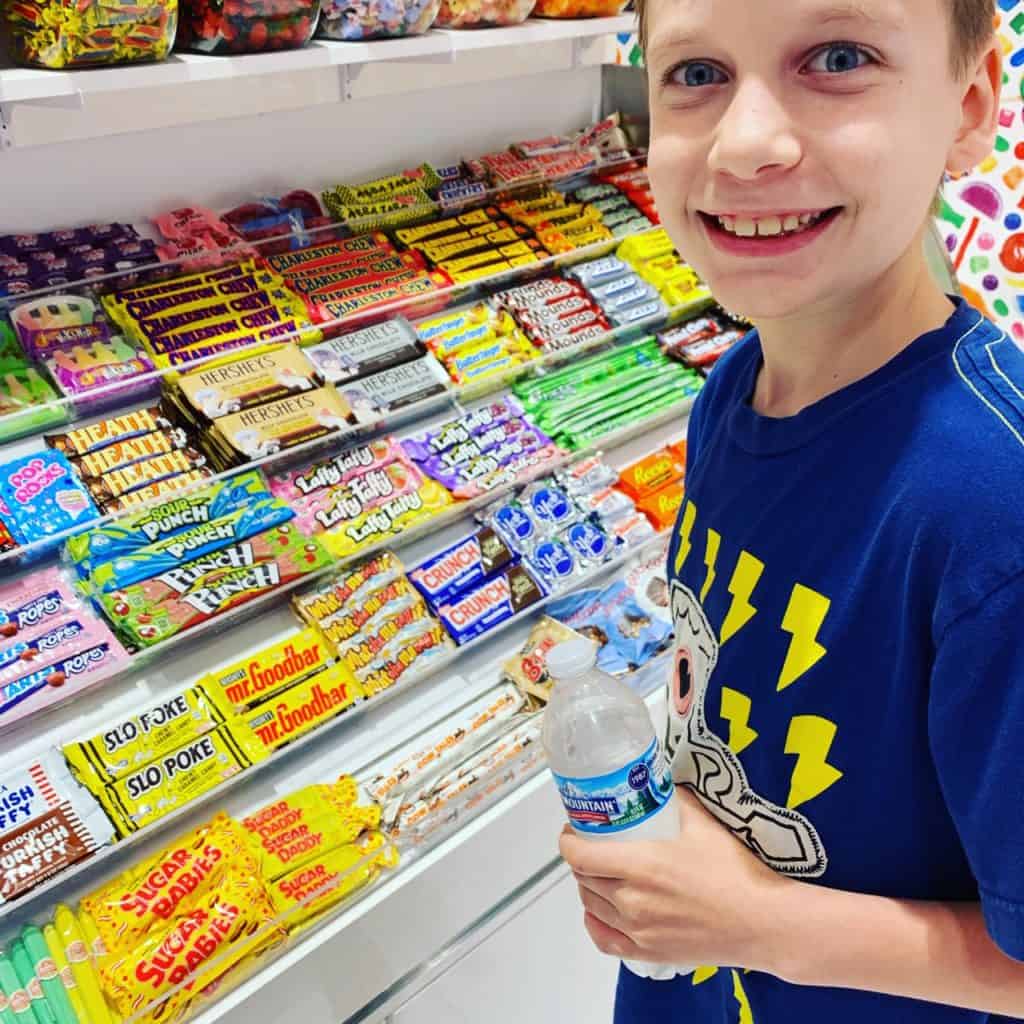
2. Also, stay away from artificial dyes.
Unfortunately, there is more to worry about in these sugary foods than sugar. Artificial food dyes are used to make candy look fun and inviting and exciting! Yet, they are another one of the foods to avoid for adhd.
For instance, if your ADHD Kiddo experiences hyperactivity after eating a food, it may be from Red Dye 40, an artificial coloring found in even brown, green, and white foods. Blue 1, it seems, crosses the blood brain barrier, entering the bloodstream and possibly the brain.
And it’s not just hyperactivity we have to worry about. Food Dyes can also increase inflammation and disrupt the functioning of the immune system, contain toxic cancer causing elements and may cause growth of cancerous tumors.
This doctor ,and mom of an ADHD kid who avoids food dyes, did some extensive research on food dyes. While she had trouble finding conclusive evidence, she wholeheartedly keeps her kids away from artificial food dyes when she can.
The good news is that as concerned parents and physicians keep noticing a link between food dyes and adhd symptoms, more and more studies are cropping up listing the possible harm of food dyes.
The FDA requires companies to list artificial food dyes on their labels, so avoiding them is easy. Look for dyes with numbers, like Red 40, Yellow 5, and Blue 1.
3. ADHD’ers should avoid preservatives in their food.
The Feingold Diet for ADHD eliminates three main artificial preservatives – butylated hydroxyanisole (BHA), butylated hydroxytoluene (BHT), and tert-Butrylhdryquinone (TBHQ).
These preservatives are found in foods that need to last a long time – snack foods, gum, butter, meats, baked goods, to name a few. Avoiding processed foods is the best thing to do to avoid preservatives.
These preservatives can cause serious health hazards such as hypersensitivity, allergy, asthma, hyperactivity, neurological damage and cancer.
The Feingold Association has a list of approved foods you can find HERE.
4. Avoid typical allergens like gluten, dairy, soy, and corn.
Foods that are common allergens, like gluten and dairy, can cause inflammation in the body and have an adverse effect on executive function skills. ADHD’ers already struggle with executive function skills like short term memory and gluten may compound it.
There are some interesting links to ADHD and allergies. Some researchers think that 70 to 80% of ADDers have a gluten insensitivity .Both food allergies and ADHD have many things in common like lowered neurotransmitters and the two are often co-morbid.
So, it makes total sense that cutting out allergens very well might help the symptoms of ADHD.
Ideas to Avoid These Ingredients for an ADHD Diet
(An Update for a teenager is below! Keep Reading!)
Ideas to keep sweet treats way down for your kids as you follow an ADHD Diet:
- Read labels and avoid anything that has High Fructose Corn Syrup – or one if it’s new forms.
- Say,”No, thank you.” to all treats we are offered at the bank, the hair salon, the grocery store, etc.
- Drink water, carbonated water, and unsweetened almond milk-period at home.
- Limit “desserts” to one or two days a week.
- Limit processed foods to one packaged item per day, in school lunch. Choices may include organic sweet potato chips, or Mary’s Gone Crackers.
- Make your own “treats” as often as possible, like cowboy cookies, or walnut date bars using dates, almond or coconut flour and as little sweetener as possible. (These cookbooks are my favorite for finding healthy treats.)
- Talk about how food makes you feel and notice how you feel after eating not so healthy choices.
- Try to get a dopamine rush from exercise. Make exercise a daily habit to help stay away from sugar.
BUT, perfectionism is not the goal. just keep making changes to do better.
When you know better, you do better
It’s up to you to dig and find information – the food companies do not want you to know this stuff – because you’ll stop buying their food.
In the seventies, scientists came up with the perfect mix of sugar, salt, and fat to maximize your brain’s pleasure center. The food industry has been using this formula for years and is literally creating food that “hooks your brain”.
As a parent to two ADHD kiddos myself, I don’t have to explain to you that this journey is one of learning and arming ourselves with the correct information. When you have all this great information about all the havoc that sugary foods can wreak, it is so much easier to make changes.
Rome wasn’t built in a day. Make changes slowly. Do what seems the easiest first.
Wait, how does this work with teenagers????
*******Update: I now have a teenager!******************
My 15 year old, who struggles to fit in socially as it is, begs me to have a lunch that looks like everyone else’s.
I feel his pain and I continue to make it an opportunity to talk to him.
We have conversations with my son where I talk about the benefits of our adhd diet and the negative effects of too much sugar. He barely listens and really doesn’t believe me.
But I do it anyway and it’s slowly sinking in.
There are lots of situations where sugary sweets are present and I am not – and he overindulges just about every time. He comes home feeling sick and we talk about why his stomach aches, his usually less than stellar behavior, and what to do the next time.
He’s had a few instances where he is beginning to see the correlation between his behavior and how he is feeling and what he eats.
Start the conversation and keep it going…and going.
I know it will take time. There are so many ridiculous places where sweets are offered-school parties and functions, boy scout meetings, track practice, band competitions, houses of friends and family, holidays, and birthday parties.
We really do have the power to change the world-one sucker at a time!!
Please share this article if you know of a mom who would benefit from this information and take a screen shot of the list below to take to the grocery store.
The Big List of Foods to Avoid for ADHD
- all artificial colors, such as:
- blue 1 (Brilliant Blue)
- blue 2 (Indigotine)
- green 3 (Green S or Fast Green)
- orange B
- red 2 (Citrus Red)
- red 3 (Erythrosine)
- red 40 (Allura Red AC)
- yellow 5 (Tartrazine)
- yellow 6 (Sunset Yellow)
- artificial flavorings, such as:
- vanilla
- peppermint (including mint-flavored toothpaste and mouthwash)
- strawberry, raspberry
- artificial preservatives –
- butylated hydroxyanisole (BHA)
- butylated hydroxytoluene (BHT)
- tert-Butrylhdryquinone (TBHQ)
- Foods that are common allergens, like gluten, corn, soy, and dairy.
Need more advice for an ADHD Diet?
Read about The Best Breakfasts for ADHD HERE – it’s our most popular post to date.
Here’s how we do lunches with ADHD.
Our favorite snacks for ADHD are listed HERE.
Need some great unplugged gift ideas for ADHD kids? Get the guide, HERE.
*Affiliate Links provided for your convenience.
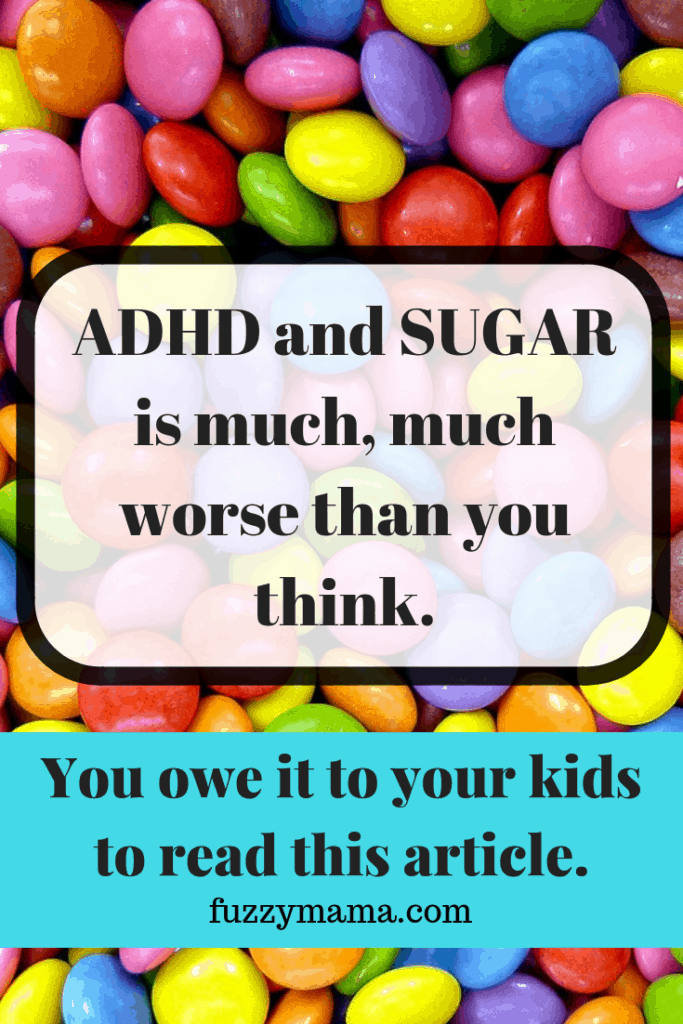


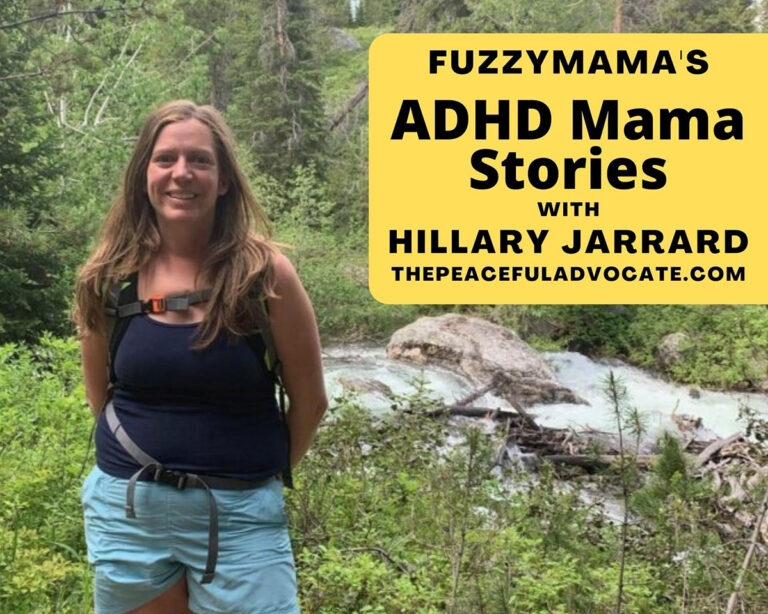


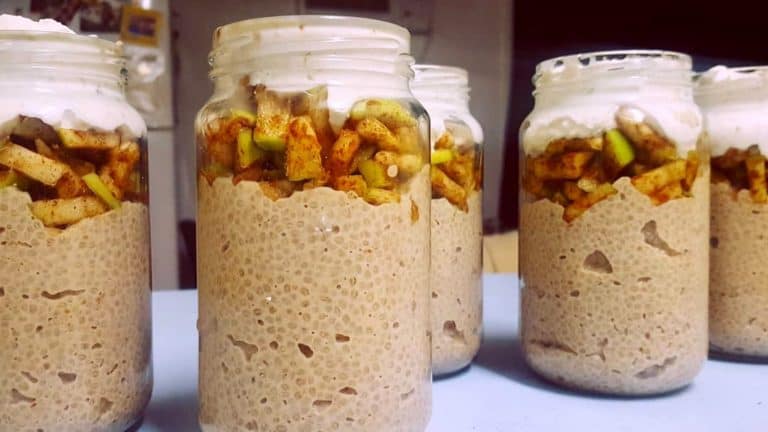
So glad to hear someone address the issue of sugar and process foods for hyperactive kids. In the 1978, I discovered that my 18 month old daughter could not eat sugar, preservatives or red food coloring. Made her very hyper and it was a next day affect. Had doctors tell me she was just spoiled. Fought family to keep these foods out of her diet. Now days she would have been diagnosed as ADHD but through diet she never took meds, did very well in school and is a well adjusted adult. Wish more parents would clean up their children’s diets instead of resorting to meds.
How great that you had such a fantastic intuition about your daughters diet. I’ve noticed for a loooong time that it does really affect my kids. It’s sad that there is just not a lot of information out there in the mainstream. Hopefully more people will get on the bandwagon with us! Your daughter is lucky to have you!
My biggest fight against sugar is just the struggle to have to make everything myself. It’s a real challenge to take the time to make so much from scratch. It’s expensive too! My husband and I eat low carb but the thought of including my kids is overwhelming. I already feel like most of my life is spent prepping food. Do you struggle too?
Hi Jen, YES! I do often feel like I spend a lot of time in the kitchen. I try to make big batches of things to eat over the course of a few days. Also, we have several things we like and just keep rotating. Do you ever do freezer meals? That is one thing I have to get better at. Did you see my latest post with 75 meals for an ADHD diet? It’s our easy faves that we just keep rotating. We eat a lot of eggs, too!! On toast, with salsa, in a big veggie bake…it helps with our budget. I also order from Imperfect Produce. I can get organic for less than conventional! Are your kids picky eaters, like mine kind of are?
Thanks for your reply. I’ve toyed with the idea of freezer meals but never seem to pull it off. We eat a fair amount of eggs too but my kids seem to get sick of them, especially my picky-eater daughter.
I also try to cook enough to have left overs but my family always seems to eat most everything. Lol I guess I need to get used to cooking even larger batches!
I’ll have to check out your list with your favorites. Thanks!
For a mom of 2 boys with ADHD, I would love to be able to offer them such a diet to keep their sugar down & bad behaviors at a minimum. However, being that I live on a very very limited budget these items all come at a much higher price. When you have a child who is hungry, you feed them what you can afford. Unfortunately, that means having to purchase items with HFCS and other high sugary items as well as carbs. Luckily, my boys do enjoy vegitables & fruit as well as most meats & milk products. But if I had to switch to an almond milk that could very possibly more than double my milk cost in a month. I don’t have the money to spend. Once it’s gone, it’s gone. I would love to be able to do something for my boys, but financially, I just don’t see a way to make it happen. Believe me I know what is best for my boys, but I also know that money only goes so far. So it makes things difficult!
Hi Kate! Thanks for your note. Yes, I know this stuff is expensive, but I think it’s great to be aware and do what you can – sounds like you are already doing that! I try to make as much of my own food as possible to avoid HFCS. We don’t drink milk or almond milk….just water mostly. We eat a TON of eggs because they are cheap and I plan all my meals around what is on sale. You probably already do that stuff. Being aware is the first step and just do what you can. You are doing a great job!
Hi,
I was wondering what you give your boys for breakfast?
Hi Lissette! Check out my Best Breakfasts for ADHD Post – that shows you what I feed my kids 90% of the time. Then let me know if you have any questions. Thanks!!
Only do almond milk if you make it yourself. If you can only afford pasteurized homogenized dairy products, they are better off without it. If you want to cut out sugar, just do it. Take a close look at your finances and see how to make buying more whole foods work. See what you can get from local farmers. Grow a garden. Get creative with how to offer nutritious foods! Pick up a copy of the book Nourishing Traditions which has some tips on cooking whole foods on a budget. I spend a good share of our income on food, but we don’t go to the doctor unless someone is physically injured. We don’t get serious illnesses. I actually have a child with dyslexia and knowing I am working to keep her body and mind healthy with good foods is one thing I can do to help her be successful. My grandson has ADHD and his single mom has made many dietary changes for his benefit while living in Section 8 housing and having very limited income. You can do this!!
Yes!!So many great suggestions. I have not tried to make almond milk myself. We bought raw dairy when my kids were little – it’s just hard to get.
You’re doing great. The kids will be fine.with. “Wellness culture” loves to shame you and never address the privilege and ableism it runs on. Honestly, even if you did have the finances to overhaul your pantry I’d bet it wouldn’t make as big a difference as you think. Food is food. Food does not have morals. 2 podcasts I recommend if you want some well researched info that will make you feel better I recommend
Maintenance Phase – The trouble with sugar and 10 Percent Happier – The Anti Diet with Evelyn Tribole. Very enlightening. Hope that helps. The fact you’re even worried about your kids and trying to take action tells me they have a good mama and they’re going to be fine 🙂
I don’t believe in shaming, just trying to do the best I can on any given day. My teens go to McDonalds with their friends now and it makes me mad….but theyve got to start making their own choices. : )
Agree completely with your writing. I myself have been removing sugar from my diet, as I have to watch my AIC — I made the cowboy cookies over the weekend…. tweaked them using molasses instead of honey, and added 2 cups of oatmeal, to replace some of the almond flour, added some chia and flax and a few choc. chips… did NOT tell my hubby they were healthy. — he said they are his FAVORITE so far! .. it’s the molasses. – satisfying!!
Yeah!! I bet they were delicious. The recipe is so easy to tweak. I will have to try the molasses next time! Thanks for sharing and keep in touch!
Jana an would it be possible to get the recipe for the cowboy cookies, my email is [email protected], many thanks Monica
Check out my Best Breakfasts Post – the full recipe is in there. https://www.fuzzymama.com/best-breakfasts-adhd/
Let me know how you like them!
Honey is important food,its been misunderstood, also fresh fruits and berries are so important for children, the brain food is glycose, dates, coconut shugar, there are options!
Hi Liisa, Thanks for your comment….we do use honey a lot for sweetness – my kids love it!
I’m curious about the sources you got your information from. Could you include them please? Unless you are a psychiatrist or pediatric physician I definitely think you should include reliable sources.
HI Faith! Yes, I am not an “expert”. There are many, many articles sighted – just click on the colored underlined words for my sources. Let me know if you’d like more information.
The problem is, many psychiatrists and pediatric physicians don’t consider diet at all. If you’re lucky, you’ll get a food pyramid from them. Dr. Amen is an exception to this. He is a child psychiatrist and has written many books on brain health. He has one on ADHD. If you want “expert” advice, check him out. He says many of the same things that are on this blog.
Yes, he is great!! We almost did a brain scan with him, but it’s $$$. I love his IG channel.
I just stumbled across this article on Pinterest and what you are describing, fits my 6 year old daughter to a T! It is nice to know that I am not crazy. On our days where we eat whatever we want when we want, my daughter is a……bear….for the next few days. And I have noticed on days when we eat health, eggs for breast, snack on fruit and veggies, and have real meals she is nicer to her siblings, manageable, and not so crazy. I have been working on changing our diet in general, but reading after reading this, I know I need to make changes. Thank you for sharing your story.
Hey Brendon! Thanks for your note, Food can be a big deal – check out the Feingold Diet, too….great info about preservatives and dyes that lurk everywhere! Let me know how you are doing, keep in touch.
Are there any moms with kids with food allergies. I really struggle with coming up with healthy ideas for my son who has tree nut, peanut and egg allergy. I notice a lot of the adhd diet and healthy foods in general may include these ingredients and a lot of the packaged stuff are manufactured in a plant that processes them and my son cannot do. Would love to hear ideas from any allergy moms out there with food and snack options you do regularly. Thanks!
What allergies do your kids have? We steer clear of gluten, dairy, soy and corn.
Hey there, we have tons of restrictions in our house. It’s a pain: no eggs (severe), no nightshades, no gluten/corn/grains except occasional rice or oats for kids. I just try to get creative and cook as many things we can all eat together in big batches so it’s less stressful. And I also bake our own bread. And lots of breakfast muffins or breads using flax and almond milk. We do hard cheeses for snacks, I also make these simple plantain chips that are insanely good. Just plantains water salt and coconut oil. We do fresh fruit and some bulk unsweetened fruit, but not too much. We drink water and herbal tea. I won’t say it’s easy, and I make sure I’m taking care of my mental health first, so I can actually be more effective and creative in cooking for my family! Idk if that helps, but hopefully a little encouraging?
Wow Allison, you are awesome!! It must be hard to have so many allergies in your house. I’ve recently started to bake bread and I love it!! But, yes, it takes so much time. : P What are your kids’ favorite meals?
No nightshade curry is always a hit! Sometimes we do pork rind or almond flour chicken tenders. Whole chicken soup. Sweet potatoes. Zucchini and squash. Cauliflower soup with sausage. Nomato sauce for when I’m just craving tomatoes and heart of palm noodles or zoodles (good for a lasagna type thing too). Crispy chicken thighs with lemon and a rotating veggie. We are all obsessed with mushrooms fried up in some oil, then splashed with coconut aminos and cooked until they are nice and dark. Rice is the main carb side for the kids for energy. We also have a rule that if they don’t like their main dish, they can either have carrots or celery/peanut butter. That keeps the snacking to a minimum. We also do banana or pumpkin bread/muffins often.
Your kids binge when they aren’t around you because they feel deprived of normal kid food. When they are adults I bet they are going to over indulge for years because of the deprivation. I agree with a mostly healthy whole food diet but cutting out certain kind of foods and making them forbidden isn’t right either. It is going to backfire.
Hi Angela, My kids get lots of opportunities to eat “junk” food, I am just not comfortable having certain ingredients in my house. I feel like having junk will backfire, too – raising unhealthy kids. I am teaching them what’s healthy and they will have to make their own choices at some time. We all have to do what we think is right for our kids.
Beth, thank you so much for this post. I have actually come across several of your posts and found them very helpful as I begin researching ADHD. I know it takes lots of time and research to put all of this information together so I want to thank you for offering your family’s experiences as a resource for other parents! I suspect my 11-year old son has ADHD without the hyperactive component and we are getting him evaluated in the next few weeks because you can’t just get a timely appointment these days for anything!
My son has a peanut allergy and we’ve been doing immuno-therapy to address that. But it means he eats 3 peanut M&Ms every morning with the sugar and food coloring on them! Thankfully, he doesn’t like them or crave them, but it’s regular consumption of those triggers so I will have to rethink that. He does love all other kinds of sweets however.
I anticipate my biggest challenge will be sticking to a low-sugar lifestyle when my step-children are with us. Their mother buys them so much junk food and sweets on the regular. They have dessert every night, muffins, donuts, crepes for breakfast, etc. In our house, dessert is only allowed on weekends so as not to establish bad habits, but still allow for treats. Any advice for how to build-up my son’s conviction to stay low-sugar in the midst of siblings who will probably resist eating that way while they are here? My step-daughter is always baking some sugary treat as that is her hobby.
Thanks so much!
Hi Alyssa, Thanks for your note. Sugar is a tricky one…my oldest loves it. Maybe you can pick some recipes out together to cook when they are over that call for maple syrup or raw honey and start there. Buy healthier versions of sweets with only organic cane sugar or stevia. Work off the interest in cooking and get some healthier or grain free cook books from the library. Can you instill a “My house, my rules” policy? Or will that cause quite a stir? Start slow and work up…maybe reading labels of foods and showing what the recommended allowance of 25 grams of sugar actually looks like? Watching “That Sugar Movie” together. Can you have baked goods ready for them when they come, so they are of your choosing? Let me know what happens!
Help! I have a 6 year old dinosaur party and I’m trying to figure out cake. He wants volcanoes and dinosaurs on it. I’m looking into bakeries in my area and I’ve found a couple gluten and dairy free but the dye is the garden part. Any advice is appreciated!
Hi! I hear ya! Have you thought about using food to decorate instead of dyes? Just get a white icing sheet cake and build a scene with crumbled gluten free cookies for the dirt- even a fruit chunk here and there,etc and then use little plastic dinos for on the cake, too? Whole Foods does sell dye free cake supplies, but it might be more fun to create your own masterpiece with your son. How about cupcakes with crumbled cookies and a mini dino on each? I think the activities can be the super fun part – and what a great time to start stressing its the friends and the celebration of your son that’s the main part. : ) Let me know what you find.
What age did your boys start to realise how bad sugar is ? My son just turned 5 and I’ve been trying to consciously teach him since at least 2 years old and he doesn’t see the connection or care about it. Even like church handed out easter candy which I didnt know about and then hes a stuffy and runny nose like clock work anytime he has that candy crap !
Hi Teidra! Isn’t it amazing how many places give out candy?! I think I started to notice around 5 ish….and when I watched That Sugar Film and a few other food documentaries. I realized that the poor kid was brought up on corn syrup formula! We do our best to stay away from corn syrup and artificial dyes and sweeteners. I don’t want to totally deprive them of everything, so we have natural options and I bake with raw honey or maple syrup. But I am trying to educate them, too. As teenagers, they don’t care much and still eat junk if I am not around. But it is a journey, for sure! Sugar and corn syrup makes my kids a bit crazy, still- and it’s hard for them to stop eating it.
Thank you for this and I %1000 agree. My two boys ages 6 and 8 have adhd, anxiety, and sensory challenges. I have kept them off meds so far, and limit sugar, food dyes, and HFCS. They also take “focus” supplements, vitamins, and l-theanine at night. It’s such a struggle to get others to “get it”. My 6 y/o is gluten and dairy intolerant and if he has these foods, and/or, the food dyes, HFCS or sugary “treats”, he turns our family of 4 upside down. It took us years to figure out the gluten factor and I wish we would’ve known earlier as his first 5 years were much of him causing so much turmoil in our home and feeling to blame due to not being in control of himself or a “problem child.” It’s sad how uneducated the medical practices are on this topic as he was always just coined “strong-willed” and the message was “you’ll make yourself crazy by trying to pinpoint “food intolerances”, and one doctor even said, “just keep him alive until he’s 18, and these types of kids tend to be very determined and successful.” Or an allergy specialist told me, “either medicate or send him to run around the house 15 times to help him learn to channel his energy” but he doesn’t have a food allergy so it can’t be the problem. It wasn’t until he almost got kicked out a private school in Kindergarten that out of desperation, I tried to go gluten-free (he was already dairy-free) and to be mindful of dyes, and literally the first week, the teachers said they had their best week with him of his first 6 months of school. If he had a suspect food, the very next day I would get a call he was in the principal office. I wish more people understood the connection and so many kids could experience a better life, improved self-esteem, more body awareness, with less medication that will forever change brain chemistry at such an early age. I do think medication has its place but should be a last resort if possible and education of these food interactions is an important first step. Thank you for your advocacy!
How awesome you are!!! So great that you kept at it and found something to help your child. Can I quote you in the article or my newsletter? Parents need to see lots of great examples. It’s hard when docs are not helpful in the least. I applaud your hard work! Food is such a big deal!Thanks for your great story.
Thank you so much for writing all of these great articles and giving us so much information for how to approach handling an adhd child. I’m pretty sure my almost 4 year old son has it. We took him off of sugar; dye,
and gluten (he was already df) and he’s become a different child. I can tell if he somehow gets a hold of one of those things because he’s back to not listening and being a destructive whirlwind!
I also want to say thanks for being so open about how you handle discipline. I was at my wits end trying to get through to my son, but absolutely nothing worked. Once I read your articles, I knew what was going on with him and I could see the adhd clearly. I’ve become calmer in handling him and it’s helped so much.
Thanks so much Amanda!! So glad things are working for you – it’s my whole reason to share what I have learned. I know every child is different, but there are things that do seem to work for lots of kids.
I was looking for the list. There was no list of foods to avoid.
Many of your facts are actually not correct about sugar, like sugar in the brain.
Your brain actually NEEDS sugar to function properly, and continue to functioning.
Hi Emily…thanks for the suggestion, I made the post in a bit more of a list format for easy scanning. Yes, the brain needs sugar, but too much is too much. I am a teacher and a lot of kids easily eat 50 grams of sugar at lunch, not to mention loads of additives and preservatives. Sugar from natural sources is the best option….and there a lot of really bad options out there that people need to know about. That’s the point of this article…..use what you find helpful.
The brain doesn’t need sugar, it needs glycogen. The body gets that 2 ways, through sugars/carbs consumed and quickly turned into glycogen. Or from fats consumed (or stuck to your body) and converted slowly into glycogen. The glycogen is stored and ready to use when needed, so there is no reason to need to make it quickly from sugars/carbs.
The downside to using sugars/carbs to fill your glycogen stores, is your body needs to use insulin to process sugars/carbs. Since sugars in your blood is toxic, the insulin is an emergency response and shuts down other hormone production until it feels the situation is safe again.
Another thing that insulin does, is blocks out all other neurotransmitters from the brain, other then dopamine! So until that insulin clears the blood of sugars, only dopamine is getting to the brain. Which is why having a low/no suagr/carb diet is so important.
Thanks Amber!!! What an easily understood explanation. Let me know if you have a blog/website and I will link to it with your comment.
I didn’t know that doing the gluten free diet decades ago would cause catastrophic reactions if glutened when on a clean diet. This is what I’ve been trying to tell others that if pesticides can do that to a child, then what damage is it causing everyone who doesn’t do the gluten free diet. Believe me , pesticides is the culprit of it all. It’s not the gluten or sugar etc. but how it’s processed , sprayed and soaked with chemicals, . before it gets to our table.
Sharon…yes!! So many pesticides sprayed on wheat products…it’s awful!
My ADHD kid has tree nut allergies, but also has, quite literally, 5 foods she will eat. And of those 5, 3 of them are brand specific. Peanut butter is one of my saving graces. We use all natural, HFCS free peanut butter, just peanuts & salt. And Smuckers natural grape jelly (the only HGCS free grape jelly I have EVER been able to find). Bread is another matter entirely. But I will say that she loves steak (not that we can afford that all the time) and some other meats. Not a fruit or vegetable in sight. We are working to get her comfortable with mild veggies like cucumbers and celery, but progress is slow. I feel completely overwhelmed by the long list of things she shouldn’t have and the incredibly short list of things she will eat. Rarely ever do the 2 have any crossover. I try where I can, but fed is best and so we continue to struggle. My husband and I are equally averse to medicating her for as long as possible, so we try where we can, but its hard. Thank you for confirming for me what we have long suspected to be true. Now I just need to figure out how to avoid those things.
Hi Claudia! Picky eating can be so frustrating! My teens seem to be reverting back to the toddler years. Katie Kimball and Shawna Hughes both have great ideas for picky eating. Check them out on Instagram or just look for their websites. Great stuff!!
I don’t believe you’ve used “comorbid ” correctly here as inflammation and adhd are not diagnosed as cause of death.
Hi Elle, Yes, I’m not talking about death…just a term to use when two or more conditions coexist.
I love how you wrote this! It felt very personal and made me feel less alone in my struggles! The advice to talk through it all is so simple but genius at the same time! Thank you so much for sharing from one mom to another 💕
Thanks Katelynn! I started my blog because it is what I needed myself….just to see that other moms are on a similar journey. : )